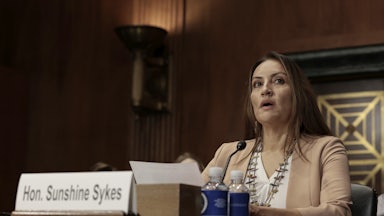The jobs report abhors a vacuum. A government shutdown prevented the Bureau of Labor Statistics on Friday from issuing its monthly report on job creation, so the business press told us what the report would reveal if there were one. “U.S. Job Growth Is Slowing Even Without Government Data to Show It,” said Bloomberg. “Shutdown Delays Jobs Report,” said The Washington Post, “Obscuring Potential Economic Problems.”
We can guess that the BLS report, if there were a BLS report, would be bad, because the payrolls processor ADP reported this week that the private sector shed 32,000 jobs in September. Economists surveyed by Bloomberg estimated that 53,000 jobs were added last month, which is still pretty meager. The workforce analytics company Revelio Labs put the gain slightly higher, at 60,000 jobs. The “outplacement” consulting firm Challenger, Gray & Christmas—these are the folks who help your boss fire you—reported that hiring was weaker in September than at any time since 2009. As the economic forecaster Bob Dylan observed in “Subterranean Homesick Blues,” you don’t need a weatherman to know which way the wind blows.
But the absence of a BLS jobs report allows Trump to dismiss these alternate measures as less authoritative, which is true. Never mind that Trump’s idea of data that’s authoritative is data that makes him look good. He fired BLS Commissioner Erika McEntarfer in August when the BLS reported that the economy created 258,000 fewer jobs in May and June than previously thought. Trump then nominated a partisan hack named E.J. Antoni to take McEntarfer’s place. Trump withdrew Antoni’s nomination earlier this week after a series of negative stories. One of these was that Antoni told Fox News that BLS should suspend its monthly reports while it sought to improve its methodology. “How on earth are businesses supposed to plan—or how is the Fed supposed to conduct monetary policy—when they don’t know how many jobs are being added or lost in our economy?” he asked.
Good point! But what Antoni didn’t grasp (or didn’t want to grasp) was that withholding BLS jobs data leaves business and the Fed more stranded than releasing imperfect BLS jobs data. We’re experiencing that void now.
To judge from the unofficial jobs surveys, weak job creation probably means the Fed will drop interest rates again when it meets October 28 and 29. But until the Fed sees the BLS’s September data, which won’t happen until the shutdown ends, that’s less certain. Another consideration is that wages appear to be rising briskly—4.5 percent, per ADP—prompting inflation risks that argue against rate cuts. The paradox of Trump’s fury over low job-creation numbers is that the higher those numbers go, the less likely it becomes that the Fed will lower interest rates, and the more contortions Stephen Miran, Trump’s yes-man on the Fed Board of Governors, will have to perform to argue for big rate cuts.
But what if you could keep the government shut down long enough to prevent BLS from collecting the data it will need to report the consumer price index on October 14? Then the Fed would have less information than otherwise to judge whether inflation is too high! The Fed’s preferred inflation metric is the Commerce Department’s personal consumption index, or PCI, not the CPI, but the PCI depends on BLS data, and anyway the next PCI release won’t come out until after the Fed makes its decision. A delay in the CPI might also mean Social Security recipients will receive a lower cost-of-living adjustment, which I presume Trump would judge a plus.
The government shutdown, then, turns out to be heaven for Trump: Although we know the economy is faltering, we don’t know how much it’s faltering because we don’t have the data. As Liza Featherstone noted Monday, Trump is waging war against data. No jobs numbers are better than bad jobs numbers.
This last point hasn’t escaped notice from Senator Elizabeth Warren. On Thursday, she wrote Russell Vought, the OMB director and Project 2025 architect, to demand that the jobs number not be held hostage to the government shutdown. “According to experts,” Warren observed, “the data for Friday’s report is likely ready for public release.” Indeed, as former BLS Commissioner Bill Beach said in an interview this week, “The jobs report is likely written in final draft and could be released on Friday, should the agency reopen.” If it’s written in final draft, why wait? “The administration is choosing not to release Friday’s jobs report,” Warren concluded.
In the realm of economic analysis, no news can easily translate into bad news. If the Trump administration has no official reason to withhold the September BLS jobs numbers during the government shutdown, and yet is withholding them anyway, that raises a legitimate suspicion that the BLS numbers are worse than what we’re hearing from Bloomberg’s panel of economists, ADP, Revelio, Challenger, Gray, and others. The stock market clearly hasn’t thought this through, because on Friday it was up. The stock market has been generally delusional of late; it appears to be delusional on this point too. Anyway, until I see the BLS data for September, I’ll assume the economy is in worse shape than we know.








